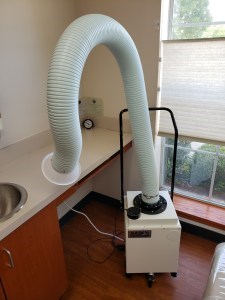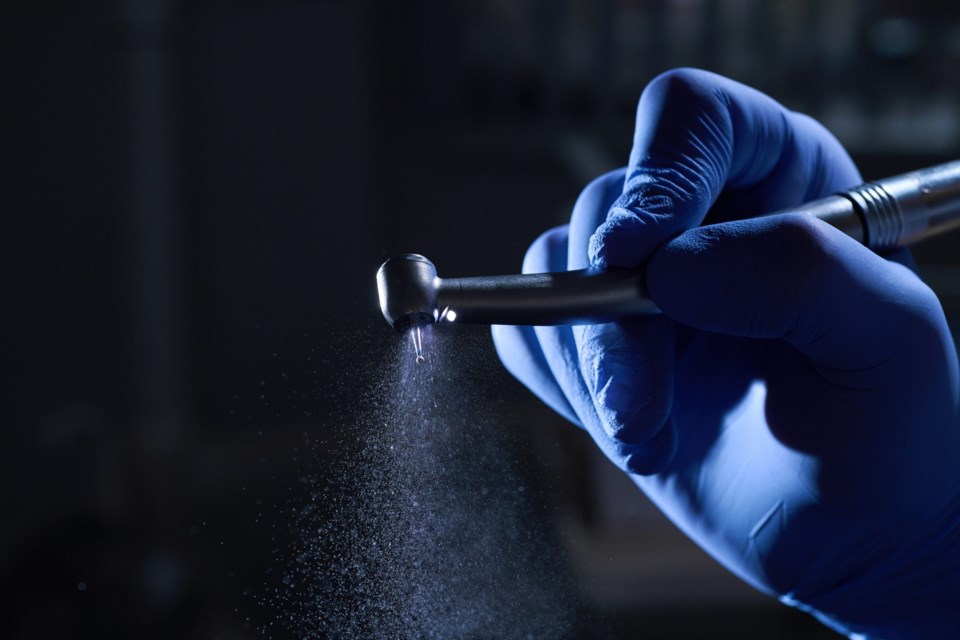A week before Dr. Fred Rabinowitz reopened the doors of his Plano office, the dentist
marshaled his staff through a walk-through of every possible question and scenario. “What do we do if patients don’t wear masks or follow precautions?” “How do we move patients from point A to point B with as little contact as possible?” Queries like these filled their day as the team prepared to go back to work in their germ-filled profession.
According to The New York Times, dentists and their staff face the highest risk of exposure to COVID-19—higher than police, paramedics and janitors. Dr. Rabinowitz wanted to reopen, but in his words, he wanted “to do it right.” So when his team gathered on May 4, they weren’t alone in the office.
Perched in a corner of a treatment room was “Wall-E,” the odd-looking air filtration device that Rabinowitz recently purchased for the hefty sum of $1,800. This device, he explained to the staff, would be the office’s primary defender against the coronavirus—which experts say can be transmitted through the air. By literally sucking up the saliva and spittle around a patient’s mouth, the device the Plano staff named after the lovable Pixar robot could conceivably save lives. The staff had one big question: “Can we see how much it sucks?”
The device is similar to a HEPA filter, but its marketers swear that its high-powered fan and
motor make it a much more powerful tool. Sold by the Houston-based Sentry Air Systems, its officially named Medical Sentry SS-300-MED. “Wall-E” rolls off the tongue a bit better, and, well, it looks like a robot.

According to Dr. Rabinowitz, the idea to get a device like this came to him in a dream.
“I do my best thinking when I’m asleep,” he says. “One night, I dreamt about a system like this. So, when I woke up, I called my personal patent attorney to discuss it. He said, ‘Dad, if you’ve thought of it, someone has already thought of it.’”
Rabinowitz’s son was right. A quick Google search led the dentist to Sentry Air Systems and a call with the amiable Omar Ilsever, the company’s Vice President of sales and marketing.
“I know a lot of Dr. Rabinowitzes,” Ilsever says, “so I just call him Dr. Fred.”
According to Ilsever, Dr. Fred was one of the first dentists in the United States to procure this new system, and the first dentist to get one in Collin County. Consequently, Rabinowitz set off a chain reaction, recommending it to colleagues who, in turn, recommended it to their colleagues.
Ilsever says the company has now sold the air filtration device to over 700 dentists across the country, and he expects over 1,000 offices will have their own Wall-Es in the near future.
The appeal is obvious: dentists deal with a lot of germs, and they are rightfully worried that the standard practices will not cover it anymore. This device could be fit for pharmacies, surgery suites, and basically anywhere where medicine is practiced. As explained by its verbose product description, this device “pulls airborne contaminants away from the operator’s breathing zone and into the filtration system.” Translation: with Wall-E around, there’s far less chance of anything gross getting near you.
Which brings us back to that morning on May 4, when Rabinowitz and his staff tested out the new machine in their office. “How much does it suck?” they wondered. The answer: Everything.
No matter what the dentist’s team put in its path, Wall-E sucked it up.
“We’re afraid if a patient has a toupee on, it’s going to get sucked up,” Rabinowitz says.
Calls to dentist offices across Collin County revealed that, as of May 12, no other dentist has yet to purchase a new air filtration device like this. That doesn’t mean they are not taking reopening seriously.
At Collin Creek Dental, for instance, Dr. Larry Whiting’s staff is administering a questionnaire that asks patients questions about testing positive, having a cough, and having a high temperature. If patients answer “No” to all ten questions, they are permitted to proceed with their appointment.
“The people that come in feel pretty confident,” Dr. Whiting says. “It’s the people that don’t that are worried.”
As Whiting and other dentists scramble to further secure their offices, some of them are
wondering if they have a larger role to play in the fight against COVID-19. In April, members of the Academy of General Dentistry proposed the idea that dentists could test for the coronavirus in their offices, but that idea has since been nixed. For now, most dentists in Collin County are practicing methods similar to Whiting’s, and adapting as needed.
In his office, Dr. Rabinowitz has seen a steady stream of patients since reopening Monday, May 11.
He believes Wall-E has something to do with that, too. Returning patients learned about the new device in an email before the office reopened, and feedback thus far has been positive, even if, according to the dentist, it makes patients feel like they’re “prepping for brain surgery.”
Rabinowitz hopes other Collin County dentists get their own devices, though he knows price may be a factor. When he ordered his first Wall-E, he put another on hold. He called Ilsever back a couple of weeks later, and learned about the device’s spike in demand.
“They told me it won’t be available until the end of June,” Rabinowitz says. “And then they said, ‘By the way, the price has gone up $500.’”




